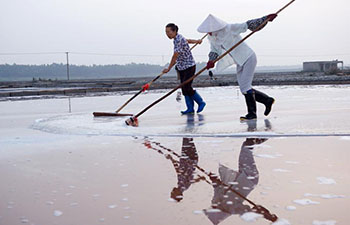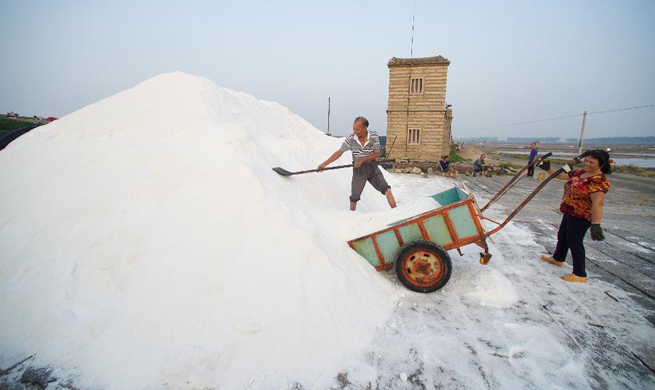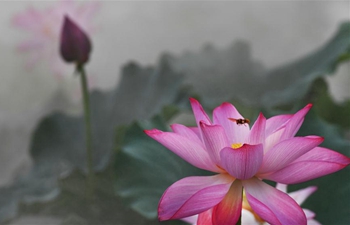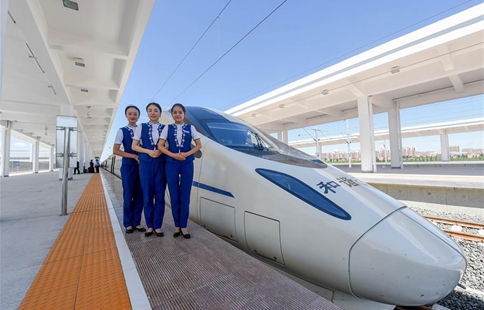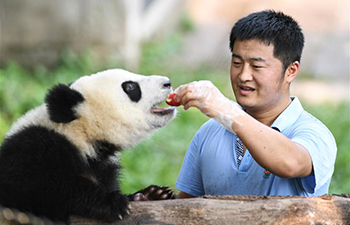by Robert Manyara
NAKURU, Kenya, Aug. 6 (Xinhua) -- Women from historically marginalized indigenous communities in Kenya have embraced an innovative savings scheme that has enabled them to break the yoke of poverty worsened by retrogressive cultural practices and illiteracy.
Emily Kirui, a single mother of one from the Ogiek community that resides in dense forests in the Rift Valley region, endured the agony of poverty and landlessness before the savings scheme came to her salvation four years ago.
She is currently the chairperson of Matumaini Young Women Group, which was formed by 14 women from the Ogiek community in the Mariashoni area of Nakuru County in the Rift Valley region.
"We started the group out of sheer need to empower ourselves, having gone through a lot of suffering," Kirui told Xinhua during a recent interview.
"We were basically surviving on wages from farm work in neighboring potato and maize plantations since we have no land of our own," she added.
Kirui noted that back in the day, menial jobs were the only ones available for women owing to the fact they lacked proper education to secure formal and secure employment.
"The women's empowerment group has changed our lives. We have managed to secure loans from Youth Development Fund and Women Enterprise Fund, which we invested in Irish potato and maize farming. Our savings have overtime increased and the members are now able to meet their needs without working in other peoples' farms," said Kirui.
Her group members practice so-called table banking that enhances savings and allows them to request for loans with minimal interest rates.
The group's sterling performance in table banking qualified it for a loan from the state-administered women and youth funds.
Its outstanding efforts to eradicate abject poverty among women from indigenous communities won accolades from the United Nations.
In 2014, the Youth Enterprise Development Fund (YEDF) granted each member of the the group a 100 U.S. dollar loan for them to pay for rental fees of an acre of land each to grow Irish potatoes and maize for sale to nearby markets.
"Those who planted Irish potatoes harvested an average of 28 bags while those who planted maize harvested an average of 18 bags. The prices for both crops ranged from 15 dollars to 10 dollars," said Kirui.
She added that besides managing to repay the loan, each member boosted her savings, thereby strengthening the group's revenue base.
"No member is worried now about school fees for their children or capital to start a business," Kirui told Xinhua.
"I am excited now since I can comfortably meet the needs of my 14-year-old daughter," she added.
The women and girls from indigenous communities are vulnerable to harmful cultural practices such as female genital cut and early marriages.
Nevertheless, financial empowerment has cushioned them from the snares of outdated cultural practices that often confine them to the margins.
"When poverty is rampant, girls are pushed into early marriages, but the case is different when mothers are able to support them financially," Kirui said.
However, the Ogiek women are still challenged with inaccessibility to information on how to benefit from government-run funds which they can tap into and start a profitable venture.
"Many of the Ogiek women are not aware of the existence of Uwezo Fund or Women Enterprise Fund. There is a lot of work to be done to educate them on how to form groups and benefit from these funds," said Kirui.
According to Lucy Mulenkei, executive director of the Indigenous Information Network (IIN), women from indigenous tribes are key players in Kenya's economy, hence the need to implement initiatives aimed at empowering them.
Mulenkei said women from marginalized communities should be encouraged to form groups through which they can empower themselves financially and free themselves from poverty.
"Savings schemes are crucial to assisting women empower themselves socially and economically. The benefits can also be felt by girls as women are empowered to support their needs," said Mulenkei.
"For example, an empowered woman can help a girl overcome her difficulties in accessing sanitary products. This way she will have enabled her to go to school instead of dropping off," she added.
The women-led savings schemes have advanced gender parity in Kenya in line with the country's Vision 2030 blueprint on socio-economic transformation.








